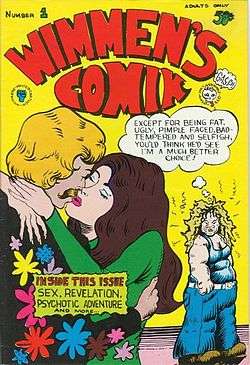Wimmen's Comix
| Wimmen's Comix | |
|---|---|
|
The cover to Wimmen's Comix #1, November 1972. Art by Patricia Moodian. | |
| Publication information | |
| Publisher |
Last Gasp (1972–1985) Renegade Press (1987–1988) Rip Off Press (1989–1992) |
| Schedule | Annually |
| Format | Ongoing series |
| Publication date | November 1972 - 1992 |
| Number of issues | 17 |
Wimmen's Comix, later titled Wimmin's Comix, is an influential all-female underground comics anthology published from 1972 to 1992. Though it covered a wide range of genre and subject matter, Wimmen's Comix focused more than other anthologies of the time on feminist concerns, homosexuality, sex and politics in general, and autobiographical comics.[1][2] Wimmen's Comix #1 featured the first-ever comic strip featuring an "out" lesbian, Trina Robbins' "Sandy Comes Out."[3] Wimmen's Comix was a launching pad for many cartoonists' careers, and inspired other small-press and self-published titles like Dyke Shorts and Dynamite Damsels.[1]
History
Wimmen's Comix debuted a few years after the publication of the 1970 one-shot (also published by Last Gasp) It Ain't Me, Babe, the first American comic book entirely produced by women, and put together by Trina Robbins,[1] the most prolific and influential of the women cartoonists in the underground scene. (It Ain't Me Babe was a feminist newspaper in Berkeley, California.)[2] Many of the creators from the It Ain't Me Babe comic went on to contribute to Wimmen's Comix.[4]
Originally, the group behind Wimmen's Comix was not an official collective, but rather a few women artists who came together with a common interest to create at least one comic that women could get paid to be in, in a male-dominated comix culture.[1] The first issue was edited by musician and artist Patricia Moodian.[2] Later issues (17 total in 20 years) were edited by a different editor, or different editors who shared the job.[2]
In 1975, regular contributors Aline Kominsky-Crumb and Diane Noomin left to start their own title, Twisted Sisters. (Kominsky-Crumb has later claimed that a large part of her break with the Wimmen's Comix group was over feminist issues.)[5] Many Wimmen's Comix' contributors, including Aline Kominsky-Crumb, Penny Van Horn, Carol Tyler, M.K. Brown, Diane Noomin, Phoebe Gloeckner, Carol Lay, Caryn Leschen, Leslie Sternbergh, Dori Seda, Mary Fleener, and Krystine Kryttre, subsequently appeared in Twisted Sisters: A Collection of Bad Girl Art (Viking Penguin) and Twisted Sisters: Drawing the Line (Kitchen Sink Press), both edited by Noomin.
In 1992, for issue #17, the title of the comic was changed to Wimmin's Comix following a discussion over the gender politics of words containing "man" or "men" (see womyn).[2] This, and other political conflicts, along with financial difficulties and the increasing availability of other venues for independent female cartoonists, led to the end of the series after that issue.[2]
Every issue of Wimmen's Comix is reprinted in The Complete Wimmen's Comix, a two-volume collection released in February 2016.[6]
Contributors
List of cartoonists in the first issue
|
Cartoonists in later issues
|
See also
References
- 1 2 3 4 Johnson, Kjerstin. "Adventures in Feministory: Women's Comics of the '70s and '80s," Bitch magazine (April 6, 2009).
- 1 2 3 4 5 6 Robbins, Trina. "Wimmen's Studies," Comix Grrrlz (May 25, 2010). Accessed Sept. 28, 2010.
- ↑ Kaplan, Arie. Masters of the Comic Book Universe Revealed!. (Chicago Review Press, 2006) ISBN 1-55652-633-4, p.86.
- ↑ Jacobs, Rita D (March 2016). "The Complete Wimmen's Comix". World Literature Today. 90 (2). Retrieved 9 March 2016 – via EBSCO. (subscription required (help)).
- ↑ Kominsky-Crumb, Aline. (2007). Need More Love. New York: MQ Publications. ISBN 1-84601-133-7.
- ↑ http://www.fantagraphics.com/completewimmenscomix/
External links
- Wimmen's Comix at Lambiek's Comiclopedia
- Wimmen's Comix at the Comic Book DB
- Diane Noomin's Wimmen and Comix Presentation at the 2003 UF Comics Conference
- Wimmen's Comix @ Last Gasp
